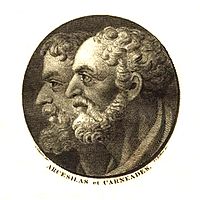Arcesilaus
| Arcesilaus | |
|---|---|

Arcesilaus and Carneades
|
|
| Born | 316/5 BC, Pitane, Aeolis |
| Died | 241/0 BC Athens |
| Era | Ancient philosophy |
| Region | Western Philosophy |
| School | Platonism |
|
Main interests
|
Platonism, Academic skepticism |
|
Notable ideas
|
Founder of Academic skepticism |
|
Influences
|
|
|
Influenced
|
|
Arcesilaus (/ˌɑːrsɛsᵻˈleɪ.əs/; Greek: Ἀρκεσίλαος; 316/5–241/0 BC) was a Greek philosopher and founder of the Second or Middle Academy—the phase of Academic skepticism. Arcesilaus succeeded Crates as the sixth head (scholarch) of the Academy c. 264 BC. He did not preserve his thoughts in writing, so his opinions can only be gleaned second-hand from what is preserved by later writers. He was the first Academic to adopt a position of philosophical skepticism, that is, he doubted the ability of the senses to discover truth about the world, although he may have continued to believe in the existence of truth itself. This brought in the skeptical phase of the Academy. His chief opponents were the Stoics and their belief that reality could be comprehended with certainty.
Arcesilaus was born in Pitane in Aeolis. His early education was provided by Autolycus the mathematician, with whom he migrated to Sardis. Afterwards, he studied rhetoric in Athens; but adopted philosophy and became a disciple first of Theophrastus and afterwards of Crantor. He subsequently became intimate with Polemo and Crates, and eventually became head of the school (σχολάρχης).
...
Wikipedia
